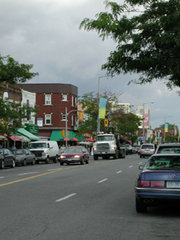Bloor West Village
|
|
Bloor West Village is a neighbourhood in Toronto, Ontario, Canada that is bounded by Bloor Street West to the South, Runnymede Road to the East, Jane Street to the West, and Annette Street to the North. The centrepiece of the community is the shopping district on Bloor Street that runs the length of the neighbourhood. It is located directly North of the Swansea Village neighbourhood.
Bloor West Village's first residents were immigrants of Eastern European origin. These residents helped found the Bloor West Village Business Improvement Area, the first of its kind in Canada and an idea that would soon be copied in other neighbourhoods across the city and country.
Homes in this neighbourhood are generally characterized by deep porches and wood trim on the fašades. Streets in this streetcar suburb, which was annexed by the city of Toronto in 1909 make this a popular residential neighbourhood. Much of its development is owed to the creation of a streetcar line along Bloor Street, which the TTC later replaced by the Bloor-Danforth subway line, built in the 1960s.
Bloor West Village is Canada's oldest business improvement area, established in 1970. It now consists of more than 400 shops, restaurants and services. The organization promotes business activity in the area by holding several annual events and festivals. It also puts efforts into the beautification of the area.
The Bloor West Village Ukrainian Festival, which celebrates the prominent Ukrainian influence in the community, takes place in August of each year and is one of the city's most popular events. It draws tens of thousands of people per year.
The entire neighbourhood participates in an annual garage sale called the Village Pillage (http://villagepillage.com/), billed as the largest sale in Toronto.
A great furor accompanied the arrival of a Chapters-Indigo bookstore in the late 1990s. Aside from discontent about the effect of a large bookstore undermining older local businesses, many residents were upset that the local historic movie theatre was going to be gutted to make room for the new store. However, most people realized that the arrival of Chapters was in fact a saving grace for the historical Runnymede Theatre. At the time Chapters was the only company willing to make the $5 million investment to restore the building and save it from being condemned. If this had not happened, the building likely would have been demolished by now if for no other reason than public saftey.

